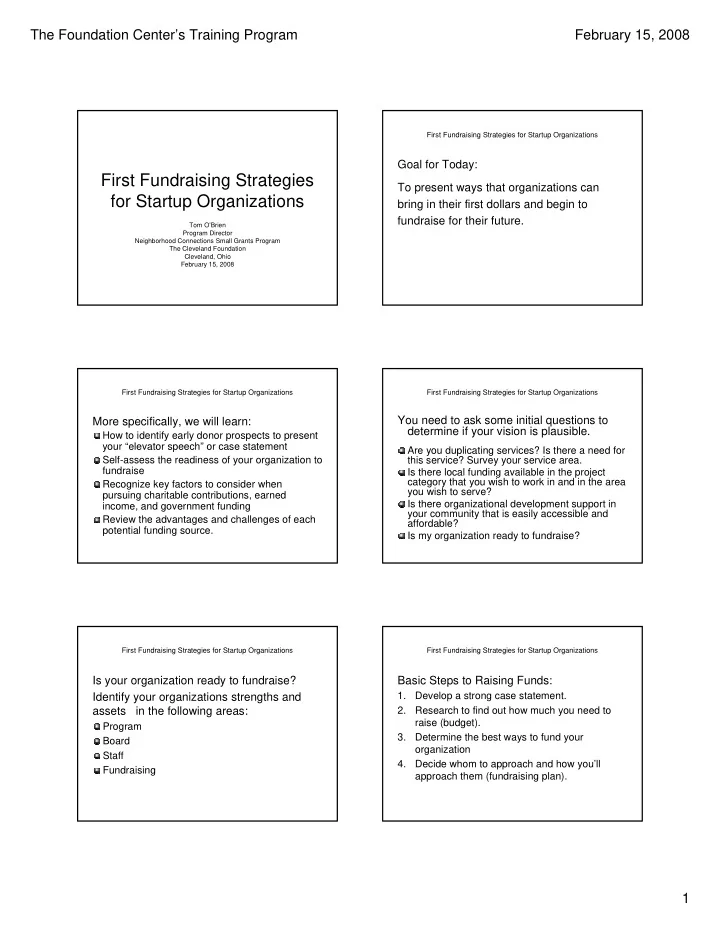

The Foundation Center’s Training Program February 15, 2008 First Fundraising Strategies for Startup Organizations Goal for Today: First Fundraising Strategies To present ways that organizations can for Startup Organizations bring in their first dollars and begin to fundraise for their future. Tom O’Brien Program Director Neighborhood Connections Small Grants Program The Cleveland Foundation Cleveland, Ohio February 15, 2008 First Fundraising Strategies for Startup Organizations First Fundraising Strategies for Startup Organizations You need to ask some initial questions to More specifically, we will learn: determine if your vision is plausible. How to identify early donor prospects to present your “elevator speech” or case statement Are you duplicating services? Is there a need for Self-assess the readiness of your organization to this service? Survey your service area. fundraise Is there local funding available in the project category that you wish to work in and in the area Recognize key factors to consider when you wish to serve? pursuing charitable contributions, earned Is there organizational development support in income, and government funding your community that is easily accessible and Review the advantages and challenges of each affordable? potential funding source. Is my organization ready to fundraise? First Fundraising Strategies for Startup Organizations First Fundraising Strategies for Startup Organizations Is your organization ready to fundraise? Basic Steps to Raising Funds: 1. Develop a strong case statement. Identify your organizations strengths and assets in the following areas: 2. Research to find out how much you need to raise (budget). Program 3. Determine the best ways to fund your Board organization Staff 4. Decide whom to approach and how you’ll Fundraising approach them (fundraising plan). 1
The Foundation Center’s Training Program February 15, 2008 First Fundraising Strategies for Startup Organizations First Fundraising Strategies for Startup Organizations To build a strong case statement, you must Develop a strong case statement answer the following questions: This document is the core element to fundraise Why does your agency exist? What is your mission? for your organization. What are the specific problems in society that you plan to address? A brief document – about two pages. Who will benefit from your work? It explains why potential funders should support What methods will you use to alleviate these problems? your organization. Do you have a track record of accomplishment? How qualified are your board, staff, volunteers, and This document informs your proposals community alliances to tackle these problems? What resources are needed to advance your efforts? How will you raise the needed funds? First Fundraising Strategies for Startup Organizations First Fundraising Strategies for Startup Organizations Create a budget to show your projected Create a Fundraising Plan expenses, your income, and the costs Set Realistic Fundraising Goals associated with what you want to do. Diversify Funding Mix Put together a fundraising plan and timetable Evaluate your efforts to plan for future years First Fundraising Strategies for Startup Organizations First Fundraising Strategies for Startup Organizations Most Startup Organizations should focus on Types of Funding Opportunities two areas for raising funds: Individual Donors Individual donors (including in kind donations Private Funding Opportunities and volunteer labor) (Foundations, Corporations, etc.) Foundation Support Earned Income Government Funding 2
The Foundation Center’s Training Program February 15, 2008 First Fundraising Strategies for Startup Organizations First Fundraising Strategies for Startup Organizations Individual Donors Individual Donors Advantages: Challenges The vast majority of all money donated to nonprofits by Need significant assistance from your board and the private sector comes from individuals. volunteers Average people, not the very wealthy, give the most Initial amounts raised usually won’t compare to grant money to nonprofit organizations. awards. Developing a donor base builds a broad base of support Need to keep track of awards and continued effort to from within the community and gives you a consistent flow of flexible resources. nurture relationship. Ongoing resource that can be expanded over time. Takes time to raise significant amounts of money. Volunteers are donated to the cause and are likely to give. First Fundraising Strategies for Startup Organizations First Fundraising Strategies for Startup Organizations Individual Donors Individual Donors Most first contributions are not financial for startup Methods community based organizations. Face to face appeals Initial contributions come in the form of in-kind gifts and volunteer time. Personal phone calls Create a list of people and organizations who have Personal letters expressed interest in your work and what each person Sending out an appeal letter might be able to contribute to help you get started. This group will be your organization’s initial donors. Special events Their contributions will show other funders that you have a base of support, which will help you raise additional funds. First Fundraising Strategies for Startup Organizations First Fundraising Strategies for Startup Organizations Individual Donors Individual Donors Have the board chair ask each board member to Publicize your efforts so potential donors are donate aware of your work. Include a request for contributions in your Recognize volunteers, donors, staff, and board newsletter efforts. Have donation envelopes or “pass the hat” for Get comfortable approaching community donations at events. members for funds. Ask volunteers, local businesses, and other supporters for donations, both financial and in- Keep good records of donations! kind. Thank them for donating! Have a regular schedule of fundraising events. 3
Recommend
More recommend